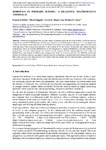Robotics in Primary School: A Realistic Mathematics Approach

Ver/Abrir
Use este enlace para citar
http://hdl.handle.net/2183/34953Colecciones
- Investigación (EPEF) [590]
Metadatos
Mostrar el registro completo del ítemTítulo
Robotics in Primary School: A Realistic Mathematics ApproachFecha
2019-06-29Cita bibliográfica
Bellas, F., Salgado, M., Blanco, T.F., Duro, R.J. (2019). Robotics in Primary School: A Realistic Mathematics Approach. In: Daniela, L. (eds) Smart Learning with Educational Robotics. Springer, Cham. https://doi.org/10.1007/978-3-030-19913-5_6
Resumen
[Abstract]: Robots are technological tools of great interest in primary education for many reasons, but mainly for their compatibility with the STEM (Science, Technology, Engineering, and Mathematics). However, it is very important to minimize the impact of the technical issues associated to robotics on the teachers, providing simple and functional tools that allow them to focus their attention in the creation of STEM content. To this end, this chapter presents a methodology, based on Realistic Mathematics, for the integration of Educational Robotics in primary schools. This methodology has been tested during one semester in the Sigüeiro Primary School (Spain) in the subject of Mathematics, with students of different ages ranging from seven up to eleven years old. Two different educational robots, with different features, was used to highlight that the methodology is independent of the robotic platform used. Motivation surveys were administered to the students after the classes. Surveys reported highly successful results, which are discussed in the chapter.
Palabras clave
Educational robots
STEM
Primary education
Robobo
Realistic Mathematics
STEM
Primary education
Robobo
Realistic Mathematics
Descripción
This version of the chapter has been accepted for publication, and is subject to Springer Nature’s AM terms of use, but is not the Version of Record and does not reflect post-acceptance improvements, or any corrections. The Version of Record is available online at: http://dx.doi.org/10.1007/978-3-030-19913-5_6
Versión del editor
Derechos
Springer Nature’s AM terms of use
https://www.springernature.com/gp/open-research/policies/accepted-manuscript-terms
ISBN
978-3-030-19912-8





